#reagan administration
Text
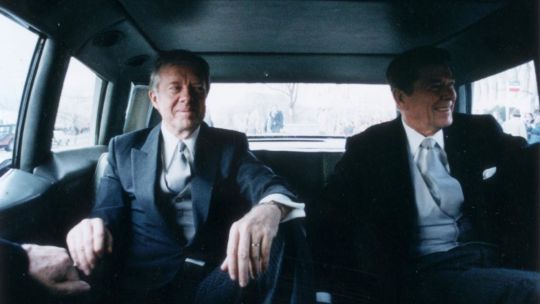
"It hurt to lose to Ronald Reagan. But after the election, I tried to make the transition as smooth as possible. Later, from my experience in trying to brief him on matters of supreme importance, I was very disturbed at his lack of interest. The issues were the 15 or 20 most important subjects that I as President could possibly pass on to him. His only reaction of substance was to express admiration for the political circumstances in South Korea that let President Park close all the colleges and draft all the demonstrators. That was the only issue on which he came alive."
-- Former President Jimmy Carter, on losing the 1980 election and the transition leading to the inauguration of Ronald Reagan, interview with TIME Magazine, October 11, 1982.
#History#Presidents#Jimmy Carter#President Carter#Carter Administration#Ronald Reagan#President Reagan#Reagan Administration#1980 Election#Presidential History#Presidency#Presidential Elections#Presidential Transitions#Inauguration of Ronald Reagan#Presidential Rivals#Presidential Rivalries#Presidential Relationships#Quotes#Presidential Quotes#Quotes by Presidents#Presidents on Presidents#Politics#Political History
4K notes
·
View notes
Text
The White House had solar panels for 7 years:
On June 20, 1979, the Carter administration installed 32 panels designed to harvest the sun's rays and use them to heat water…[Carter predicted at the dedication ceremony], “A generation from now, this solar heater can either be a curiosity, a museum piece, an example of a road not taken or it can be just a small part of one of the greatest and most exciting adventures ever undertaken by the American people."
By 1986, the Reagan administration had gutted the research and development budgets for renewable energy at the then-fledgling U.S. Department of Energy (DoE) and eliminated tax breaks for the deployment of wind turbines and solar technologies…
And in 1986 the Reagan administration quietly dismantled the White House solar panel installation while resurfacing the roof. "Hey! That system is working. Why don't you keep it?" recalls mechanical engineer Fred Morse, now of Abengoa Solar, who helped install the original solar panels as director of the solar energy program during the Carter years and then watched as they were dismantled during his tenure in the same job under Reagan.
138 notes
·
View notes
Text

#us politics#trickle down economics#economy#economics#reaganomics#reagan administration#fuck reagan#memes#shitpost#bootlickers#simping for capitalism#billionaires#fuck billionaires#tax the billionaires
180 notes
·
View notes
Text
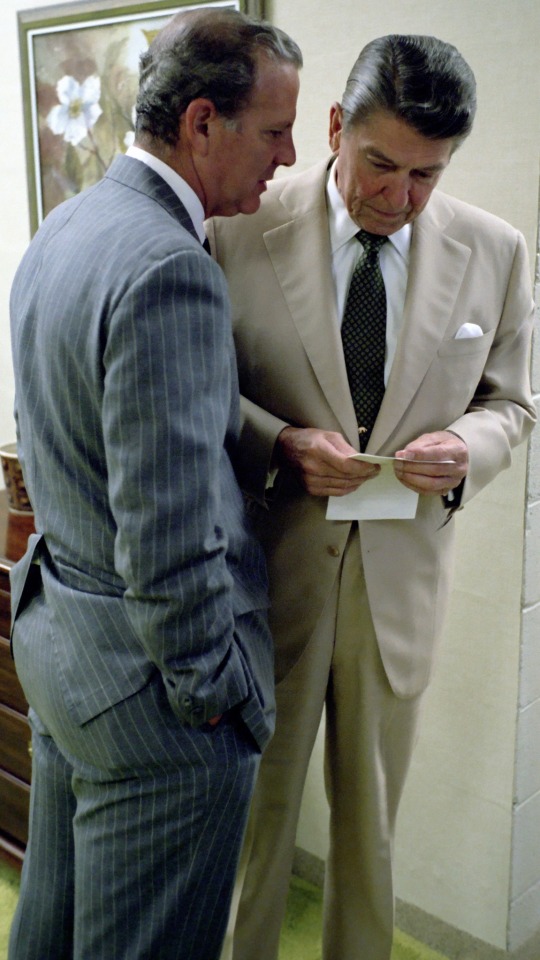
James Baker
& Ronald Reagan
#suitdaddy#suiteddaddy#suit and tie#men in suits#suitfetish#suit for men#suited grandpa#buisness suit#suitedman#suitedmen#Americans#republicans#reagan administration#secretary of state#suit ass#suited ass#suited butt#suit butt#James Baker#Ronald Reagan
104 notes
·
View notes
Text
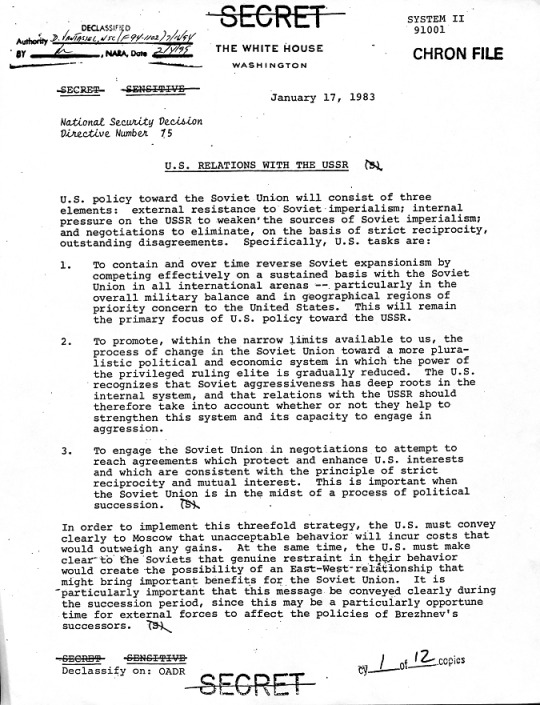
“U.S. policy toward the Soviet Union will consist of three elements: external resistance to Soviet imperialism; internal pressure on the USSR . . . and negotiations to eliminate . . . outstanding disagreements.” National Security Decision Directive 75 (p.1), 1/17/1983.
Collection RR-NSC: Numbered National Security Policy Papers
Series: National Security Decision Directives (NSDDs)
Transcription:
DECLASSIFIED
Authority: D. VanTassel, NSC (F94-1102) 7/16/94
BY: [illegible], NARA, Date: 2/4/95
[strike] SECRET [end strike]
THE WHITE HOUSE
WASHINGTON
[STRIKE] SECRET SENSITIVE [end strike]
SYSTEM II
91001
CHRON FILE
January 17, 1983
National Security Decision
Directive Number 75
U.S. RELATIONS WITH THE USSR [strike] (S) [end strike]
U.S. policy toward the Soviet Union will consist of three elements: external resistance to Soviet imperialism; internal pressure on the USSR to weaken the sources of Soviet imperialism; and negotiations to eliminate, on the basis of strict reciprocity, outstanding disagreements. Specifically, U.S. tasks are:
1. To contain and over time reverse Soviet expansionism by competing effectively on a sustained basis with the Soviet Union in all international arenas -- particularly in the overall military balance and in geographical regions of priority concern to the United States. This will remain the primary focus of U.S. policy toward the USSR.
2. To promote, within the narrow limits available to us, the process of change in the Soviet Union toward a more pluralistic political and economic system in which the power of the privileged ruling elite is gradually reduced. The U.S. recognizes that Soviet aggressiveness has deep roots in the internal system, and that relations with the USSR should therefore take into account whether or not they help to strengthen this system and its capacity to engage in aggression.
3. To engage the Soviet Union in negotiations to attempt to reach agreements which protect and enhance U.S. interests and which are consistent with the principle of strict reciprocity and mutual interest. This is important when the Soviet Union is in the midst of a process of political succession. [strike] (S) [end strike]
In order to implement this threefold strategy, the U.S. must convey clearly to Moscow that unacceptable behavior will incur costs that would outweigh any gains. At the same time, the U.S. must make clear to the Soviets that genuine restraint in their behavior would create the possibility of an East-West relationship that might bring important benefits for the Soviet Union. It is particularly important that this message be conveyed clearly during the succession period, since this may be a particularly opportune time for external forces to affect the policies of Brezhnev's successors. [strike] (S) [end strike]
[strike] SECRET SENSITIVE [end strike]
Declassify on: OADR
[strike] SECRET [end strike]
cy 1 of 12 copies
55 notes
·
View notes
Text
I'm rewatching Ghostbusters for the first time in years, and it got me thinking. On the one hand Walter Peck was absolutely right, but on the other hand he worked for the Reagan administration and they didn't give half of two shits about the environment.
15 notes
·
View notes
Text
How Reagan Ruined Everything
Welcome back, fellow readers! Today, we dive headfirst into a wild ride, traveling back to the era of Ronald Reagan - the 40th President of the United States. Brace yourselves, as we explore how this enigmatic figure supposedly ruined everything that we hold dear. Yes, you heard it right, folks. In a thought-provoking YouTube video titled “How Reagan Ruined Everything,” our host…
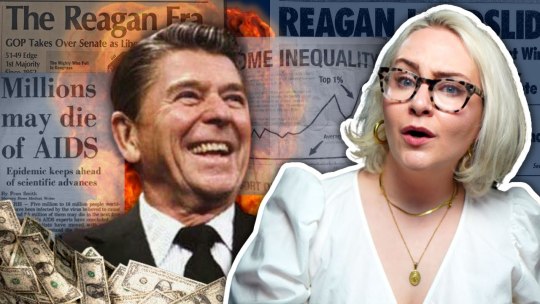
View On WordPress
0 notes
Text
Holly - Stephen King Review

** spoiler alert **
So in the afterward of Stephen King's newest novel, Holly (a continuation of the character Holly Gibney that first appeared in The Bill Hodges Trilogy, then The Outsider and the novella collection If It Bleeds and I believe is now his most written character other than Roland Deschain and the Ka-tet), Stephen King says that while Holly Gibney shares many of his own political beliefs and thoughts on life in the post-Trump Presidency and the time period when Covid was a national conversation, he hopes that if he were writing the opposite perspective, that he would be able to give that perspective justice. I don't know that I agree.
It doesn't take more than a brief glance at Stephen King's twitter feed to confirm that the man is obsessed with politics in the Trump era and specifically with Donald Trump himself. It could be he has always been this way and having easier and quicker access to his thoughts via social media confirms that, it's hard to say. It's clear to anyone who has ever read any one of his books, that Stephen King is a liberal. Always has been from when Carrie was published through now. So if you're reading a Stephen King book and you're mad that he's mad about Trump, then you're the problem. Not him.
I guess where I fall on this and granted, I haven't read everything of his (I've read 56 of his novels/short story collections and am working on the rest) is I feel he's gotten less adept at writing about politics, particularly in his fictional work (and his tweets to me read like MSNBC headlines, all bark no bite unlike Cujo). Like I said, he's always trashed republican politicians, even going back to the Reagan Administration, but he used to be so great at finding the voice of the modern, every day average person, regardless of that persons political view, they were a fleshed out character, that from their point of view, you could understand why they think the way they do.
I've only read If It Bleeds, Later and Holly in the Trump era (I think The Outsider was probably written before Trump), but I'm fairly positive Trump shows up in every one of those books, if only by name and every Trump supporting character is unintelligent, described in a way that gives them some sort of gross deformity or they're straight up evil. There's no attempt at examining why someone might support Donald Trump, beyond the fact that they're clearly just into authoritarianism.
There's no acknowledging the very real idea that at least in 2016, there was a group of Bernie supporters that also supported Donald Trump, because they were both espousing populist ideas. I know a lot of highly intelligent people that support Trump, but have reservations about the man himself, his actions, tweets, but love his policies. But even horrific politicians in his previous books, guys who in their respective stories like Greg Stillson, do even worse things (uh hello global nuclear war) than what Trump did in actuality, there's a kernel of understanding that Stephen King writes into them. It gives us interest and like/hate in those characters.
So yeah, it's impossible not to not talk about this, because it's such a glaring thing in the book. I don't think wrongly. In the period Holly takes place, Donald Trump, Joe Biden and Covid were large topics (I feel the same way about his treatment of unvaccinated people (I have the latest booster FYI so I'm completely vacc'd), he doesn't seem to understand there are reasons why someone might be unvaccinated other than to "own the libs"). So that out of the way...
Holly Gibney of the Finders Keepers private detective agency has a new case. Bonnie Dahl has gone missing and her mother Penny has hired Holly, based on recommendations, to find her missing daughter. Initially reluctant to take the case because she had recently lost her own mother due to complications with Covid and her own proclivities, Holly begins to look into the case, to discover that several people have gone missing in that area.
Meanwhile, Professors Rodney and Emily Harris, an elderly couple that are semi-retired, have a dark secret hidden in their basement.
Okay. So I do *not* feel this is a spoiler. Stephen King intentionally lets you know, just as he did in Mr. Mercedes, very quickly who the killer(s) are. That's certainly a method. One that, for me, Stephen King doesn't do a great job at fulfilling here. While yes, I'm, sickened by what the killer of Mr. Mercedes did, or the Harris' do here in Holly, there's no tension for me. There's not a second of this book, especially with how much Stephen King has talked about in interviews and the like, that I'm worried for Holly Gibney. I know she'll have some scars mentally and physically, but I know she's going to make it through.
I *liked* this book. I didn't love it. It was sort of middling Stephen King for me. I think where it misses the mark for me is the "Alfred Hitchcock bomb under the table" method of storytelling, where I think Hitchcock is a master at, these pseudo detective stories that Stephen King has been doing, I'm not sure they click for me in the way that he wants them to. And again, King used to be a master at this with things like "That was the last time they ever saw __________ alive". The reveals of the killers here and in Mr. Mercedes just undercuts the tension for me. There's nothing from them in the way that Stephen King has been great at in the past (making amazing, sympathetic villains). They're doing horrific stuff for minimal gains it seems like, they're what, if what they believe *is* true, which the novel undercuts, then they're extending their lives by a few years at best. That's just not all that interesting for me
Where the book does work and for me it's the same thing as in If It Bleeds, is the character of Holly Gibney. I'm with King in that she's one of the best things that he's done in the last decade. I'm just not completely on board with this having been a story worthy of Holly. Especially a titular story. I don't know that we learned anymore about Holly here than we did in previous stories with her. In fact I don't feel like there's a lot of character development at all for Holly, she's much the same at the beginning and end of the novel.
One of the reasons I *liked* the novel is the interactions between Jerome and Vera Steinman. I thought that was one aspect of the story where King absolutely nailed what he was going for here. The horror of the situation, the grief and impact of losing a loved one in a horrific way. I loved every time those two characters were with one another and would love to see Jerome, especially with his life taking off, expanded upon further.
Lastly, I feel like I'm confused about Holly's age. I don't know if it's because of the actors who have portrayed her, but my impression of Holly in The Outsider and If It Bleeds was that she was in her thirties. Was there a time skip that I'm not aware of, because King clearly states that she is in her early fifties here.
So yeah, I feel like I was mostly critical here. I'm sure many people will disagree with my thoughts here. But I love Stephen King and his works. Even when I disagree with him (not even saying I disagree with him in many topics that he covers in Holly, just don't think he was successful for me in conveying these topics). I wouldn't have read as much of him as I have if I were not. So if you liked Mr. Mercedes and that trilogy, then I would recommend Holly. If you were more into the supernatural aspects of The Outsider and If It Bleeds, well, maybe you'd be a little more middling to Holly like myself.
3/5
#halloween reading 2023#horror#horror novel#horror fiction#holly#holly gibney#stephen king#the bill hodges trilogy#the outsider#if it bleeds#trump presidency#covid#covid19#twitter#x#msnbc#cujo#reagan administration#authoritarianism#bernie#greg stillson#the dead zone#donald trump#joe biden#president biden#booster#finders keepers detective agency#finders keepers#bonnie dahl#penny dahl
0 notes
Video
youtube
Miserable and Broke in the US? Blame Reagan | iilluminaughtii
Thanks, Obama? Nah, fuck you Reagan!
0 notes
Text
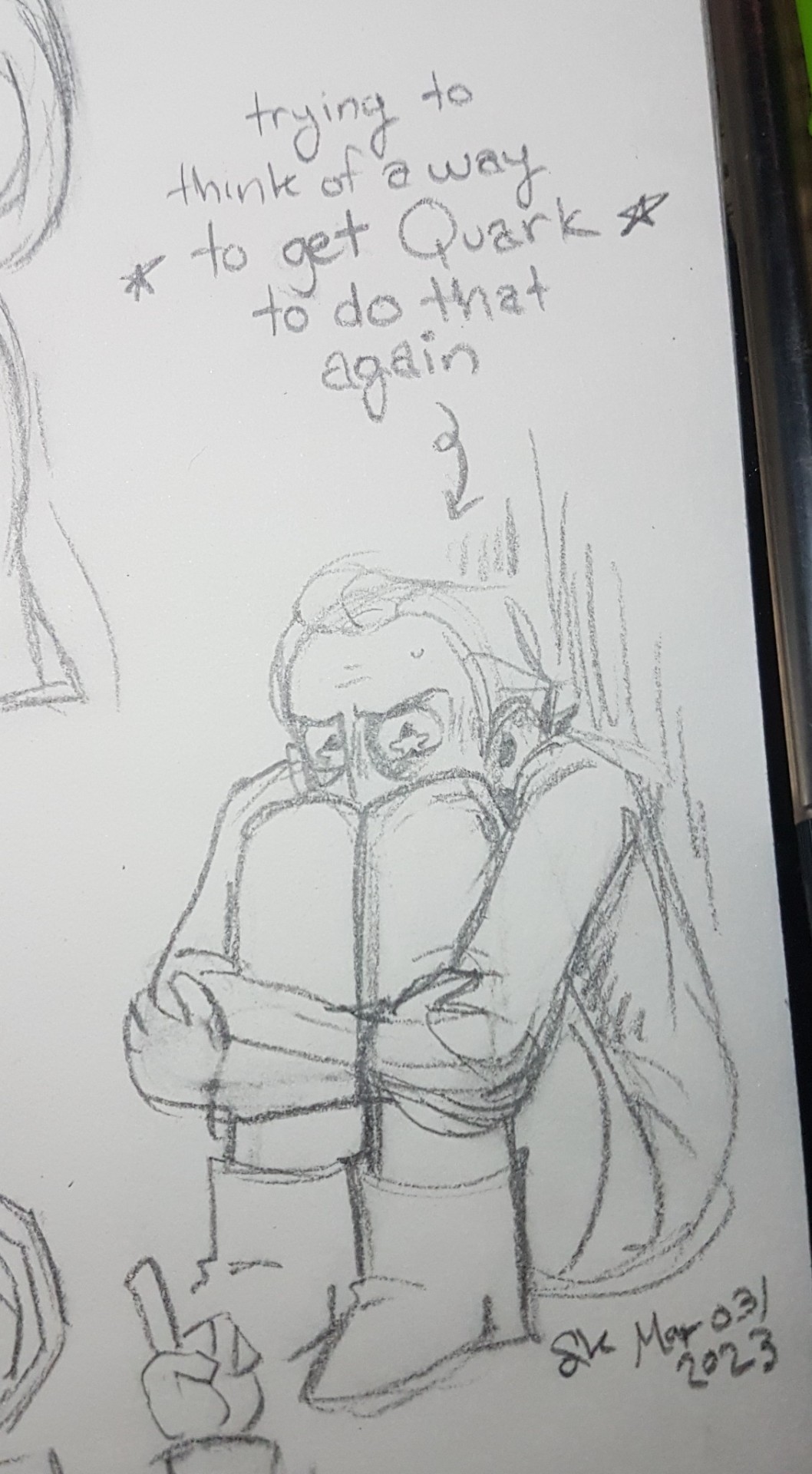


fellas is it gay if your rival is the first person to tickle you ever asking for a friend 🙈
#im here to post cringe and drink water and i forgot my water in the other room#ds9#quodo#tickling#doodlies#i hope the formatting is ok on this i havent posted since the fucking reagan administration#ds9 tickling
474 notes
·
View notes
Text
You can find so many Adam parallels in SPN. His last name is not Winchester, although technically he is one; while Winchester brothers’ motto is “family doesn’t end in blood”, Adam is the embodiment of “family doesn’t start in blood”. Michael’s pure unconditional romantic and platonic love for him is opposite to Nick’s sick murderous obsession with Lucifer (both being the two sides of the same coin). Adam has a forgiving and kind personality, he believes in being able to save the world even after he and his mother were brutally killed; his father sought revenge for Mary’s murder, destroying the only family he got left in the process. There are so many things that can be compared to Adam’s story arc. Michael’s grief after losing Adam / Dean practically forgetting about Castiel after 15x18? Adam (the son who hates the father) replacing Dean (the son who loves the father) in the Cage? Sam saying him and Eileen came to an agreement / Adam saying the same thing about him and Michael literal minutes after that? Adam had so much importance in the series, and all that being basically unnoticed by the fandom is just unfair.
#long post#adam milligan#midam#michael spn#supernatural#i love him so much all this love pours out of me like out of a faulty teapot#the ghost of adam milligan visited me while i was trying to study for my history test tomorrow about reagan’s administration#so im sorry if some bits of text might sound weird
139 notes
·
View notes
Text
"No fewer than twenty-nine of my [research] cards document [Ronald] Reagan's detachment. He was at once the most remote and the most accessible of men. Although he reveled in the constant flesh-pressing of the Presidency, and ate up flattery with a spoon, he needed regular spells of 'personal time.' Glance through the Oval Office peephole and you would see him happily writing in longhand, always with his tie straight and jacket on, ensconced in an egglike solitude that the curvature of the lens only emphasized.
Adored by so many, he was a man with no real friends. This was not due to any inherent misanthropy...Until he remarried in 1952, earnest, bespectacled Ronnie was said to be 'best friends' with [actor] William Holden, and after that with Robert Taylor. But neither man was more than a barbecue buddy. Hundreds of political supporters and associates claimed to be close to him when he was Governor of California and thousands during his Presidency. Former Senator Paul Laxalt spoke for all of them when he said, 'I guess I know Ronald Reagan as well as anybody. Of course we never talk about anything personal.'
Sooner or later, every would-be intimate (including his four children, Maureen, Michael, Patti, and Ron) discovered that the only human being Reagan truly cared about (after his mother died) was Nancy. For Laxalt, disillusionment came when the President called to thank him for his campaign help in 1984, only to pause in midsentence and audibly turn over a page of typescript. For William F. Buckley Jr., it was when Reagan showed polite relief at his inability to accept an offer of hospitality. For Michael Reagan, it was the high-school graduation day his father greeted him with 'My name is Ronald Reagan. What's yours?'
Patti Davis, Reagan's younger daughter, writes in her 1992 autobiography:
'Often I'd come into a room and he'd looked up from his notecards as though he wasn't sure who I was. [Youngest son] Ron would race up to him, small and brimming with a child's enthusiasm, and I'd see the same bewildered look in my father's eyes, like he had to remind himself who Ron was...I sometimes felt like reminded him that Maureen was his daughter, too, not just someone with similar political philosophies.'
Reagan's scrupulously kept Presidential diary is remarkable for a near-total lack of interest in people as individuals. In all its half-million or so words, I did not find any affectionate remark about his children. He conscientiously named every visitor to the Oval Office, having a printed schedule to refer to, but in conversation he tended to rely on pronouns. Nor did he pay much attention to faces. 'Nice to meet you, Mr. Ambassador,' he greeted Denis Healey, the former Defense Minister of Great Britain, while the real British Ambassador stood by. 'But I've already met him,' his Excellency [the Ambassador] complained, 'eleven times.'"
-- Edmund Morris, Ronald Reagan's authorized biographer, on President Reagan's aloof personality, "The Unknowable: Ronald Reagan's Amazing, Mysterious Life," The New Yorker, June 28, 2004.
#History#Presidents#Presidency#Presidential History#Ronald Reagan#President Reagan#Reagan Administration#Presidential Personalities#Edmund Morris#First Families#Dutch: A Memoir of Ronald Reagan#Quotes About Presidents#The Reagan Diaries#Patti Davis#Reagan Family
53 notes
·
View notes
Text
My cishet brother in law ally of the year. Every time he learns abt some new type of homophobia he's like >:( that's so MEAN why would anyone DO that‼️‼️ He learned abt chick fil a's whole thing and was so outraged. My sister (lifelong vegetarian) came home and he said "Babe we are NEVER going to chick fil a again do you know what they DO?? To gay people??? We CANNOT support that 😡😡"
#my sister (lifelong vegetarian): oh no what a hardship to give up chick fil a#the chick fil a thing actually happened a while ago but last night he learned what prep was and was like why is it a gay centered thing tho#since straight ppl can be hiv+ too and i went into the whole long etc of homophobic aids campaigns and he was like >:(#my bil learning anything abt the reagan administration: hannah did you know abt this?????#tcp
168 notes
·
View notes
Text

#us politics#news#memes#Jordan Neely#black lives matter#black lives movement#2023#mental health#mental illness#mental heath support#fund mental health services#reaganomics#reagan administration#fuck reagan#help the homeless#homelessness#house the homeless#public health#us healthcare#affordable healthcare#universal healthcare#healthcare for all#healthcare reform#expand medicare#save medicare#libertarians be like#fascists be like#republicans be like#conservatives be like#bigots be like
75 notes
·
View notes
Text
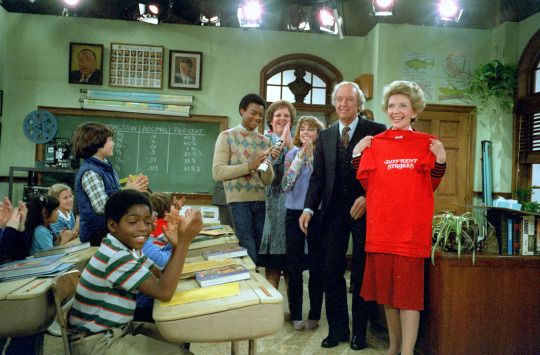
Nancy Reagan on the set of “Diff’rent Strokes,” on March 9, 1983.
Collection RR-WHPO: White House Photographic Collection
Series: Reagan White House Photographs
Image description: A television studio set as a classroom. Children, including Gary Coleman, sit at desks; adults, including Todd Bridges, Mary Jo Cattlett, Dana Plato, and Conrad Bain stand. Some of them are applauding. Next to the adults is Nancy Reagan, who is holding up a red t-shirt with the “DIFF’RENT STROKES” logo. Mrs. Reagan is in red, and the walls and chalkboard of the classroom are green, making her stand out.
#archivesgov#March 9#1983#1980s#Reagan administration#Nancy Reagan#Diff'rent Strokes#TV#classroom#Gary Coleman#Todd Bridges#Mary Jo Cattlett#Dana Plato#Conrad Bain
23 notes
·
View notes
Text



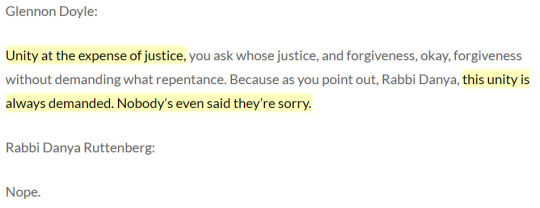

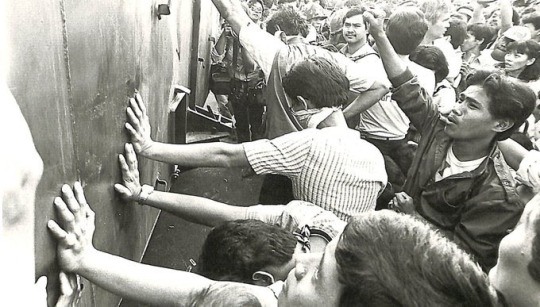

TAYO ANG EDSA
The EDSA Revolution, Feburary 22-Feburary 25, 1986
Photo Credit: Joey de Vera, Peter Reyes
Phil Star article headline / statement from Marcos (released through the Philippine News Agency) / We Can Do Hard Things Ep 164 / On Repentance and Repair, Danya Ruttenberg / Nick Joaquin
#i am. late. to this because of timezones but im still showing up#philippine history#and like. current events lmaoooo#also absolutely FUMING at the US intervention that happened. im going to doomguy reagan in hell over this#the 'marcos family flees' headlines are funny except we were denied the chance to try them for their crimes#and now we have to listen to this clusterfuck of an administration try to gaslight us all into forgetting the atrocities#comparatives tag
84 notes
·
View notes